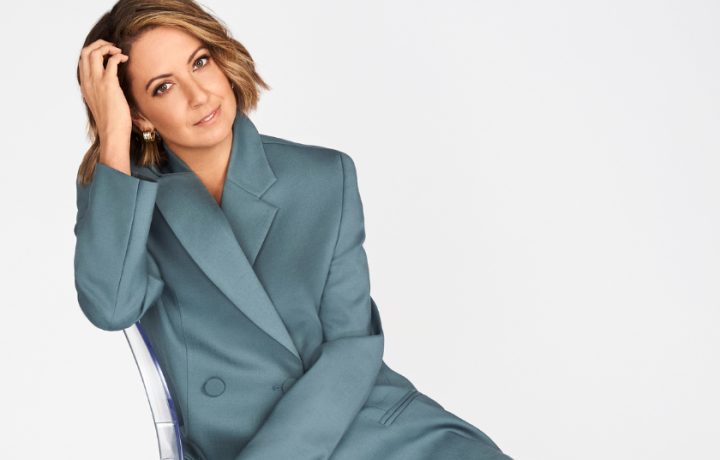Five minutes with Brooke Boney

Posted on
Journalist and proud Gamilaroi woman Brooke Boney knows how to write a good story.
But her new book All of It: Notes on public life, private joy and everything in between is the most personal story she’s told yet. A collection of witty and heartfelt essays about love, loss and ambition, she dives into everything from the downsides of having a public profile to fertility, and what’s actually worth fighting for.
We spent five minutes with her ahead of her ‘Meet the Author’ event on Thursday 10 April at the Australian National University.
As a proud Gamilaroi woman who has been in the public eye for over a decade, how has your cultural identity shaped your approach to your career and public life?
It’s hard to say exactly how it’s shaped it, because it’s so central to my identity, how I think of myself and the way I behave that I don’t know who I would be without it. I guess when I learn about the things that are markers when it comes to Indigenous ways of knowing or being, it seems obvious to me that that’s why I am the way I am. It’s difficult to separate yourself from your community, so when I make moves that are more individually focused I struggle with it.
How do you navigate being both a public figure and a voice for First Nations perspectives in Australian media?
I think the latter informs the former. I would never have sought a career as a journalist if I didn’t reflect fully on what it means when non-Aboriginal people tell our stories. I wanted to be engaged in that process and help overcome that for us, but I didn’t anticipate that it would mean that I end up writing books or being on TV every day. I’m grateful (I think) that it has but it is difficult to navigate because essentially, you’re bringing a narrow or different perspective or experience to broad audiences.
Your book title suggests a tension between public life and private joy. What prompted you to explore this particular dichotomy?
Well, that dance between the private and the public has been interesting to me ever since I became involved in it. We all grapple with it to an extent because we have private family lives and public professional lives – to differing extents – but when so much of it is for the consumption of the public when you’re on TV, it’s different. Parts of it become performative or part of your job which I think is interesting. You’re almost performing authenticity or making certain parts of what’s private, public but in a way that’s palatable.
In your book you explore concerns that are part of your early thirties – fertility, aging, career progression. Was it challenging to write so openly about these personal topics?
To be honest, I didn’t think of them as being particularly dicey or controversial until people kept saying how brave it was to talk about them. I thought to myself, “Well everyone has these struggles, they’re not unique to me so why is there any shame or guilt attached to this?” Like we’re supposed to pretend that our bodies aren’t ageing like they have been since the beginning of time, or we’re supposed to pretend that we don’t all compare ourselves to people more or less successful and wonder why or how our careers or lives have ended up the way they are? It’s more challenging now that I’m justifying it because I wonder if I am the only one who thinks this way or wonders these things in hindsight.
As a journalist, you’re trained to maintain a certain objectivity. How different was the process of writing such personal essays where you’re at the centre of the narrative?
It was hard! There were notes from editors as I was writing that were like ‘can you make this less reliant on statistics and facts and more about your experience of the things we’re talking about?’. It felt really unnatural to me. I had to kind of reprogram how I talk and think about the things I wanted to explore because I’ve always thought about things in broad contexts or how everyone would experience them, not just my personal experience.
What inspired you to write this book at this particular moment in your life?
There wasn’t one thing in particular to be honest. It was something I’d been working towards for years and I knew I had a deadline to work towards. It’s funny how it ended up coming at the same time I decided to leave the Today Show and go study, but I guess it’s just how life works out sometimes.
How do you hope readers, particularly young First Nations women, will connect with your story?
I hope they feel a bit less alone and a bit more understood. If I can give anyone the gift of that, then I’ll feel good about myself.
Having reflected on both your public and private life for this book, what are you looking forward to exploring next?
I know this sounds a bit naff but I’m really looking forward to continuing to unpack what it feels like to genuinely just be myself after having so much of what I do having to fit within certain expectations or experiences.
It’s a hard thing to explain but when you’re in the public eye for so long, you start to subconsciously filter your reactions and expressions to fit certain audiences, so it’s nice to step back from that a little bit.
All of It is in bookstores now.
THE ESSENTIALS
What: Meet the Author – Brooke Boney
When: Thursday 10 April, 6 pm – 7 pm
Where: Kambri Cinema, The Australian National University Cultural Centre, Kambri Precinct, ANU, Acton
Tickets + more information: events.humanitix.com
Feature image supplied.

